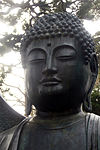Tetsuo Sōkatsu
Tetsuo Sōkatsu | |
|---|---|
| Title | Zen Master |
| Personal | |
| Born | 1870 |
| Died | 1954 |
| Religion | Buddhism |
| Nationality | Japanese |
| School | Rinzai |
| Senior posting | |
| Predecessor | Soyen Shaku |
| Successor | Gotō Zuigan Koun-an Tatsuta Eizan Roshi Sokei-an Sasaki |
| Part of a series on |
| Zen Buddhism |
|---|
 |
| Part of a series on |
| Western Buddhism |
|---|
 |
Tetsuo Sōkatsu (1870–1954)[1] was a Japanese Rinzai-master. He was a dharma heir of Soyen Shaku.[2]
Biography[edit]
Tetsuo Sokatsu received dharma transmission from Soyen Shaku at the age of 29.[2] There-after he traveled throughout Japan, on "a pilgrimage of great Zen temples".[3] Sokatsu continued his travels outside Japan for two years, visiting Burma, Ceylon and India, where he lived with "barefoot sadhus".[3]
Soyen Shaku put him in charge of Ryōbō Kai, and gave him the hermitage-name "Ryobo-an".[2] Sokatsu opened the hermitage for lay-practice, opening up the possibility of dharma transmission to lay practitioners. At the end of World War II Sokatsu closed Ryōbō Kai, but the lay practice was continued by his dharma heir Koun-an Roshi.[2]
In 1906 Sokatsu went to California[1] with a group of fourteen students, including Gotō Zuigan and Sokei-an Shigetsu Sasaki. He stayed there for four years, Sokei-an Sasaki being the only one to stay in the USA.[3]
Dharma heirs[edit]
- Gotō Zuigan, abbot of Daitoku-ji, teacher of Huston Smith, Walter Nowick
- Koun-an Tatsuta Eizan Roshi, founder of Ningen Zen Kyodan[2]
- Sokei-an Sasaki,[4] husband of Ruth Fuller Sasaki
See also[edit]
References[edit]
- ^ a b Dumoulin 2005b, p. 416.
- ^ a b c d e About Ningen Zen Kyodan
- ^ a b c Fields 1992, p. 175.
- ^ Ford 2006, p. 67.
Sources[edit]
- Dumoulin, Heinrich (2005b), Zen Buddhism: A History. Volume 2: Japan, World Wisdom Books, ISBN 9780941532907
- Fields, Rick (1992), How the Swans Came to the Lake. A Narrative History of Buddhism in America, Boston & London: Shambhala
- Ford, James Ishmael (2006), Zen Master Who?: A Guide to the People And Stories of Zen, Wisdom Publications
